Case Study Analysis: Ethical and Legal Standards in Nursing Practice
VerifiedAdded on 2022/09/18
|7
|1973
|123
Case Study
AI Summary
This case study analysis, written by a nursing student, examines an ethical dilemma encountered during a clinical placement. The scenario involves a 27-year-old patient with an acquired brain injury and anxiety, who was found wandering from the hospital. The student nurse reflects on the situation using Driscoll's Reflective Framework, exploring the conflict between patient autonomy and the principle of beneficence. The analysis highlights the importance of ethical and legal standards in nursing practice, emphasizing the need for effective communication, holistic care, and the potential consequences of neglecting a patient's mental and emotional needs. The case study underscores the challenges nurses face when balancing patient rights with the need to ensure their safety and well-being, particularly in cases involving mental health disorders. The student concludes by advocating for improved intervention strategies and a more patient-centered approach to care, stressing the crucial role nurses play in advocating for their patients' needs and respecting their decisions while upholding ethical standards.
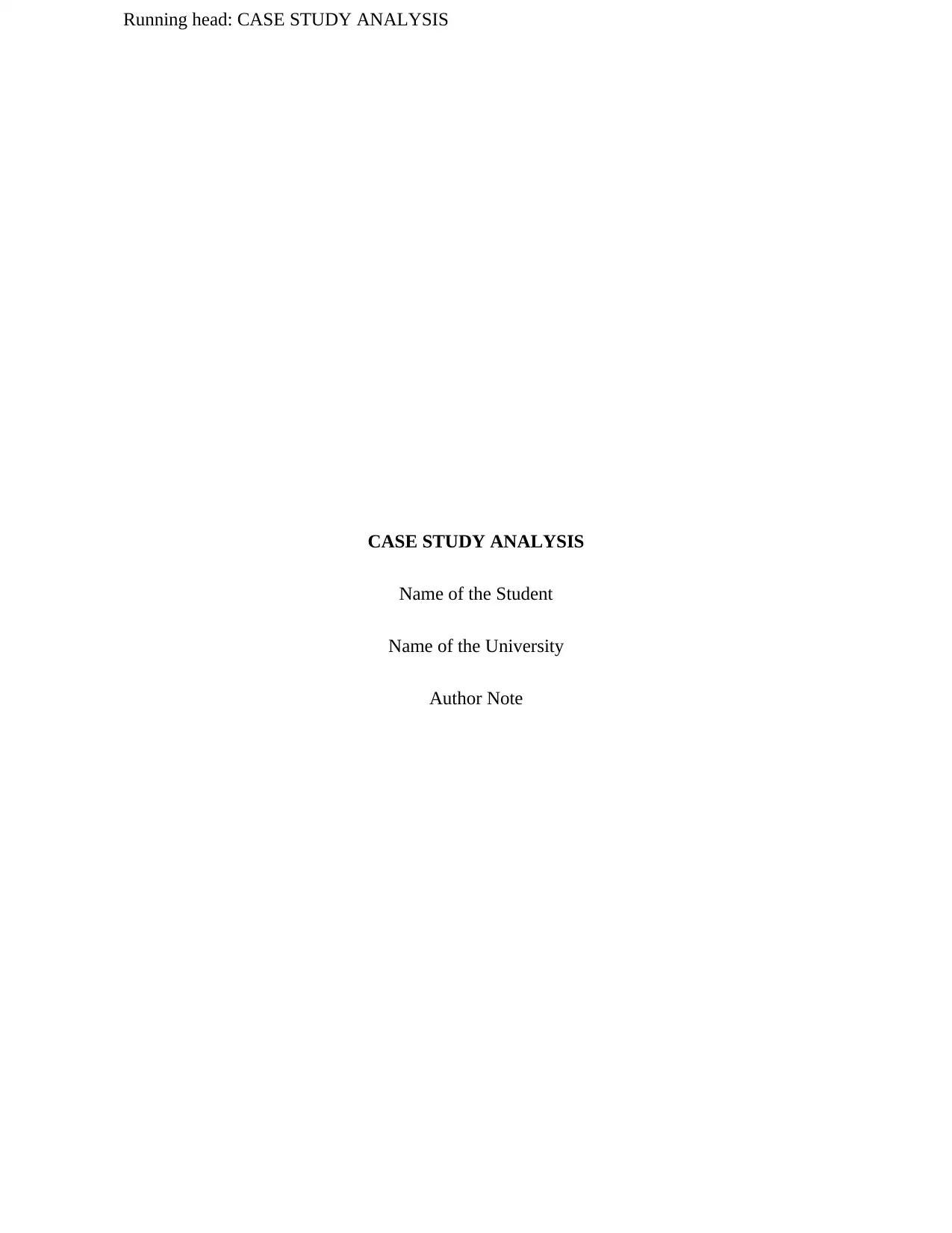
Running head: CASE STUDY ANALYSIS
CASE STUDY ANALYSIS
Name of the Student
Name of the University
Author Note
CASE STUDY ANALYSIS
Name of the Student
Name of the University
Author Note
Paraphrase This Document
Need a fresh take? Get an instant paraphrase of this document with our AI Paraphraser
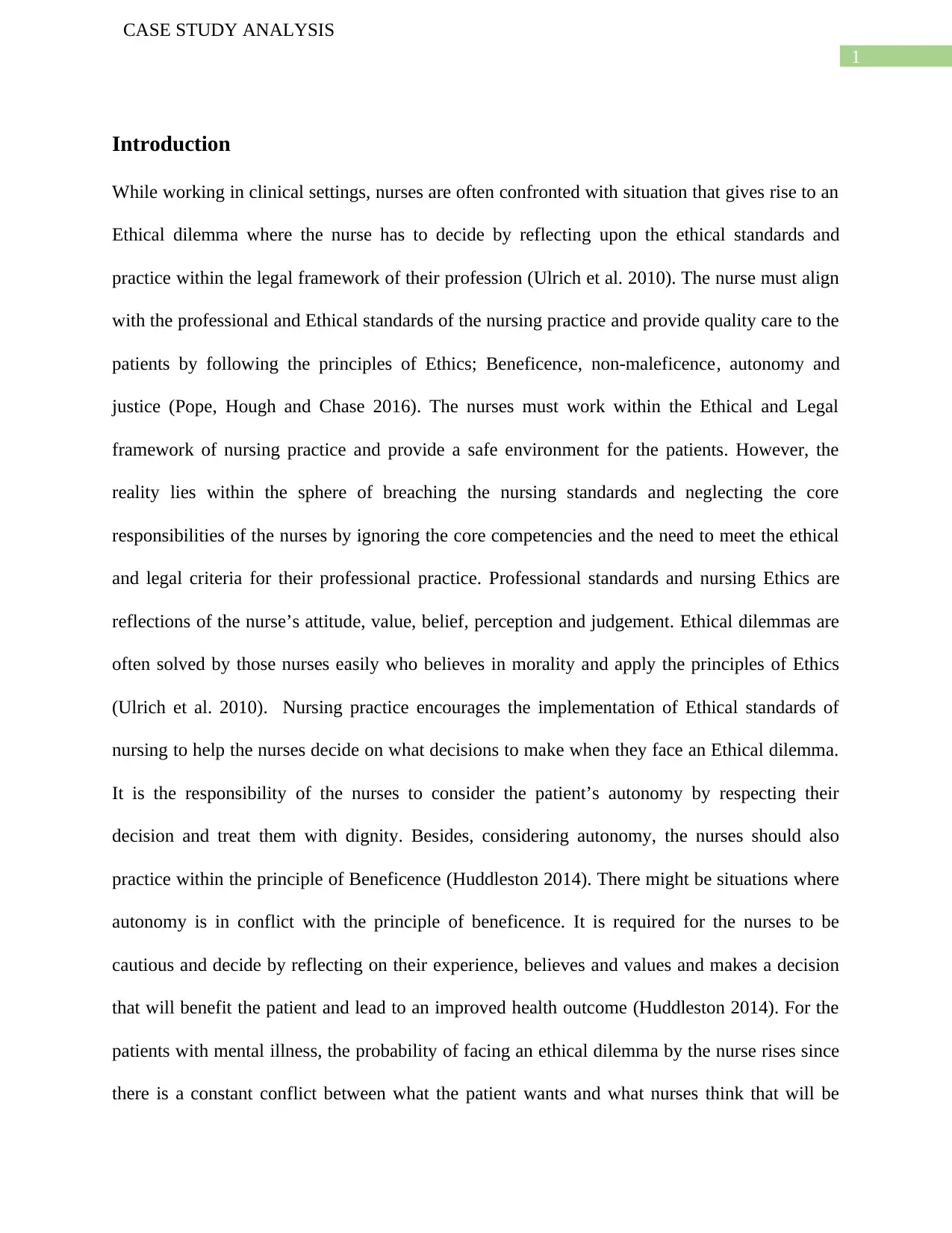
1
CASE STUDY ANALYSIS
Introduction
While working in clinical settings, nurses are often confronted with situation that gives rise to an
Ethical dilemma where the nurse has to decide by reflecting upon the ethical standards and
practice within the legal framework of their profession (Ulrich et al. 2010). The nurse must align
with the professional and Ethical standards of the nursing practice and provide quality care to the
patients by following the principles of Ethics; Beneficence, non-maleficence, autonomy and
justice (Pope, Hough and Chase 2016). The nurses must work within the Ethical and Legal
framework of nursing practice and provide a safe environment for the patients. However, the
reality lies within the sphere of breaching the nursing standards and neglecting the core
responsibilities of the nurses by ignoring the core competencies and the need to meet the ethical
and legal criteria for their professional practice. Professional standards and nursing Ethics are
reflections of the nurse’s attitude, value, belief, perception and judgement. Ethical dilemmas are
often solved by those nurses easily who believes in morality and apply the principles of Ethics
(Ulrich et al. 2010). Nursing practice encourages the implementation of Ethical standards of
nursing to help the nurses decide on what decisions to make when they face an Ethical dilemma.
It is the responsibility of the nurses to consider the patient’s autonomy by respecting their
decision and treat them with dignity. Besides, considering autonomy, the nurses should also
practice within the principle of Beneficence (Huddleston 2014). There might be situations where
autonomy is in conflict with the principle of beneficence. It is required for the nurses to be
cautious and decide by reflecting on their experience, believes and values and makes a decision
that will benefit the patient and lead to an improved health outcome (Huddleston 2014). For the
patients with mental illness, the probability of facing an ethical dilemma by the nurse rises since
there is a constant conflict between what the patient wants and what nurses think that will be
CASE STUDY ANALYSIS
Introduction
While working in clinical settings, nurses are often confronted with situation that gives rise to an
Ethical dilemma where the nurse has to decide by reflecting upon the ethical standards and
practice within the legal framework of their profession (Ulrich et al. 2010). The nurse must align
with the professional and Ethical standards of the nursing practice and provide quality care to the
patients by following the principles of Ethics; Beneficence, non-maleficence, autonomy and
justice (Pope, Hough and Chase 2016). The nurses must work within the Ethical and Legal
framework of nursing practice and provide a safe environment for the patients. However, the
reality lies within the sphere of breaching the nursing standards and neglecting the core
responsibilities of the nurses by ignoring the core competencies and the need to meet the ethical
and legal criteria for their professional practice. Professional standards and nursing Ethics are
reflections of the nurse’s attitude, value, belief, perception and judgement. Ethical dilemmas are
often solved by those nurses easily who believes in morality and apply the principles of Ethics
(Ulrich et al. 2010). Nursing practice encourages the implementation of Ethical standards of
nursing to help the nurses decide on what decisions to make when they face an Ethical dilemma.
It is the responsibility of the nurses to consider the patient’s autonomy by respecting their
decision and treat them with dignity. Besides, considering autonomy, the nurses should also
practice within the principle of Beneficence (Huddleston 2014). There might be situations where
autonomy is in conflict with the principle of beneficence. It is required for the nurses to be
cautious and decide by reflecting on their experience, believes and values and makes a decision
that will benefit the patient and lead to an improved health outcome (Huddleston 2014). For the
patients with mental illness, the probability of facing an ethical dilemma by the nurse rises since
there is a constant conflict between what the patient wants and what nurses think that will be
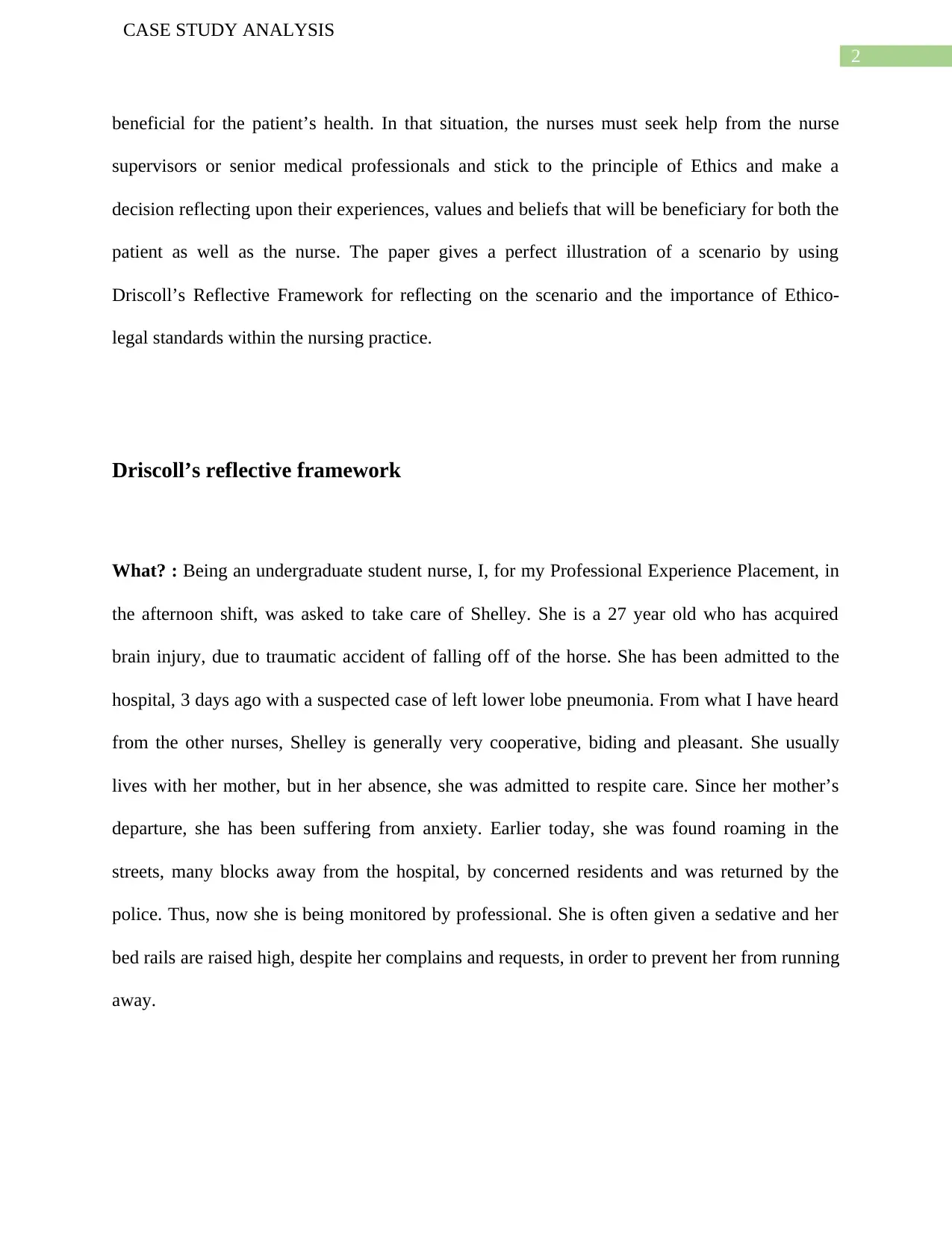
2
CASE STUDY ANALYSIS
beneficial for the patient’s health. In that situation, the nurses must seek help from the nurse
supervisors or senior medical professionals and stick to the principle of Ethics and make a
decision reflecting upon their experiences, values and beliefs that will be beneficiary for both the
patient as well as the nurse. The paper gives a perfect illustration of a scenario by using
Driscoll’s Reflective Framework for reflecting on the scenario and the importance of Ethico-
legal standards within the nursing practice.
Driscoll’s reflective framework
What? : Being an undergraduate student nurse, I, for my Professional Experience Placement, in
the afternoon shift, was asked to take care of Shelley. She is a 27 year old who has acquired
brain injury, due to traumatic accident of falling off of the horse. She has been admitted to the
hospital, 3 days ago with a suspected case of left lower lobe pneumonia. From what I have heard
from the other nurses, Shelley is generally very cooperative, biding and pleasant. She usually
lives with her mother, but in her absence, she was admitted to respite care. Since her mother’s
departure, she has been suffering from anxiety. Earlier today, she was found roaming in the
streets, many blocks away from the hospital, by concerned residents and was returned by the
police. Thus, now she is being monitored by professional. She is often given a sedative and her
bed rails are raised high, despite her complains and requests, in order to prevent her from running
away.
CASE STUDY ANALYSIS
beneficial for the patient’s health. In that situation, the nurses must seek help from the nurse
supervisors or senior medical professionals and stick to the principle of Ethics and make a
decision reflecting upon their experiences, values and beliefs that will be beneficiary for both the
patient as well as the nurse. The paper gives a perfect illustration of a scenario by using
Driscoll’s Reflective Framework for reflecting on the scenario and the importance of Ethico-
legal standards within the nursing practice.
Driscoll’s reflective framework
What? : Being an undergraduate student nurse, I, for my Professional Experience Placement, in
the afternoon shift, was asked to take care of Shelley. She is a 27 year old who has acquired
brain injury, due to traumatic accident of falling off of the horse. She has been admitted to the
hospital, 3 days ago with a suspected case of left lower lobe pneumonia. From what I have heard
from the other nurses, Shelley is generally very cooperative, biding and pleasant. She usually
lives with her mother, but in her absence, she was admitted to respite care. Since her mother’s
departure, she has been suffering from anxiety. Earlier today, she was found roaming in the
streets, many blocks away from the hospital, by concerned residents and was returned by the
police. Thus, now she is being monitored by professional. She is often given a sedative and her
bed rails are raised high, despite her complains and requests, in order to prevent her from running
away.
⊘ This is a preview!⊘
Do you want full access?
Subscribe today to unlock all pages.

Trusted by 1+ million students worldwide
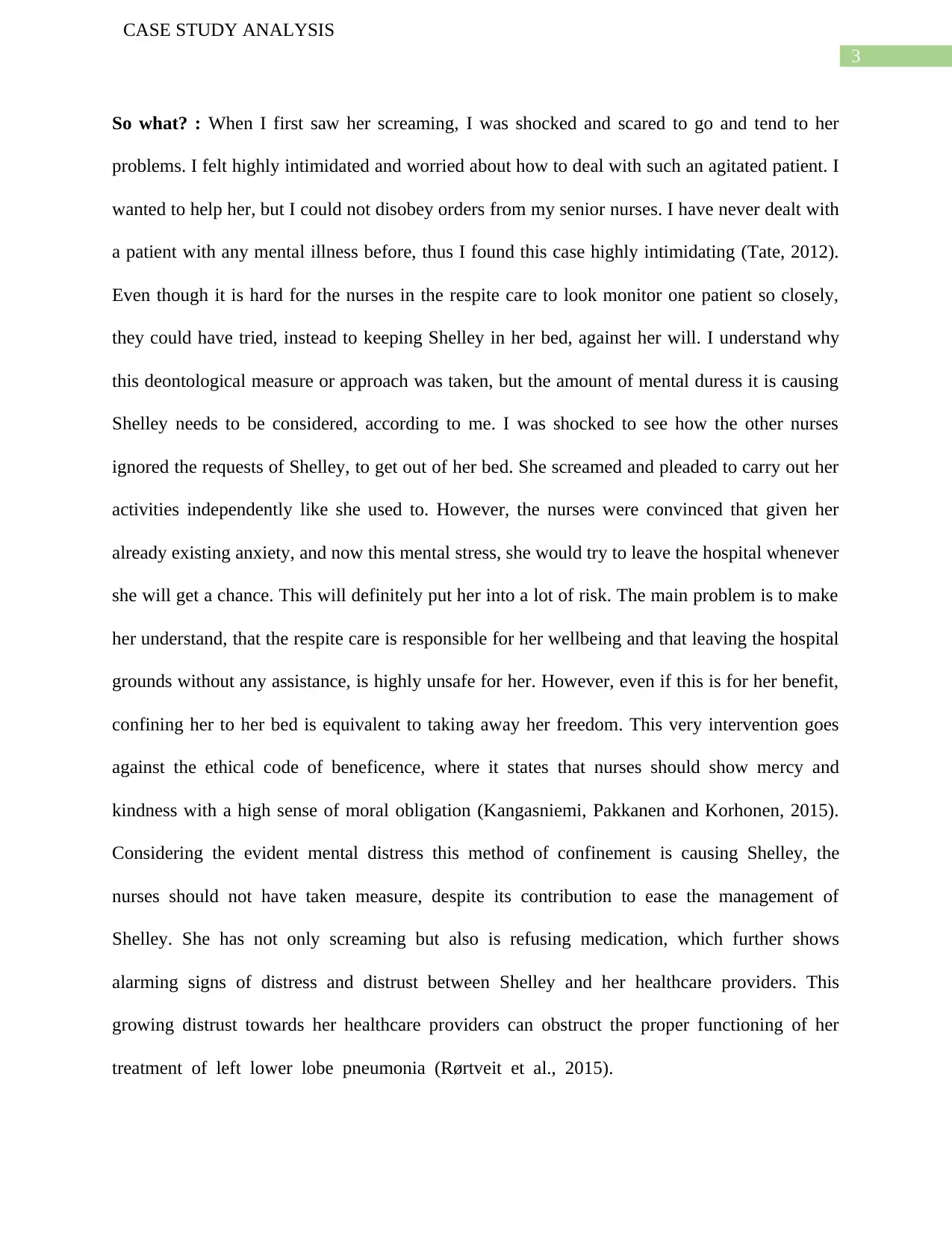
3
CASE STUDY ANALYSIS
So what? : When I first saw her screaming, I was shocked and scared to go and tend to her
problems. I felt highly intimidated and worried about how to deal with such an agitated patient. I
wanted to help her, but I could not disobey orders from my senior nurses. I have never dealt with
a patient with any mental illness before, thus I found this case highly intimidating (Tate, 2012).
Even though it is hard for the nurses in the respite care to look monitor one patient so closely,
they could have tried, instead to keeping Shelley in her bed, against her will. I understand why
this deontological measure or approach was taken, but the amount of mental duress it is causing
Shelley needs to be considered, according to me. I was shocked to see how the other nurses
ignored the requests of Shelley, to get out of her bed. She screamed and pleaded to carry out her
activities independently like she used to. However, the nurses were convinced that given her
already existing anxiety, and now this mental stress, she would try to leave the hospital whenever
she will get a chance. This will definitely put her into a lot of risk. The main problem is to make
her understand, that the respite care is responsible for her wellbeing and that leaving the hospital
grounds without any assistance, is highly unsafe for her. However, even if this is for her benefit,
confining her to her bed is equivalent to taking away her freedom. This very intervention goes
against the ethical code of beneficence, where it states that nurses should show mercy and
kindness with a high sense of moral obligation (Kangasniemi, Pakkanen and Korhonen, 2015).
Considering the evident mental distress this method of confinement is causing Shelley, the
nurses should not have taken measure, despite its contribution to ease the management of
Shelley. She has not only screaming but also is refusing medication, which further shows
alarming signs of distress and distrust between Shelley and her healthcare providers. This
growing distrust towards her healthcare providers can obstruct the proper functioning of her
treatment of left lower lobe pneumonia (Rørtveit et al., 2015).
CASE STUDY ANALYSIS
So what? : When I first saw her screaming, I was shocked and scared to go and tend to her
problems. I felt highly intimidated and worried about how to deal with such an agitated patient. I
wanted to help her, but I could not disobey orders from my senior nurses. I have never dealt with
a patient with any mental illness before, thus I found this case highly intimidating (Tate, 2012).
Even though it is hard for the nurses in the respite care to look monitor one patient so closely,
they could have tried, instead to keeping Shelley in her bed, against her will. I understand why
this deontological measure or approach was taken, but the amount of mental duress it is causing
Shelley needs to be considered, according to me. I was shocked to see how the other nurses
ignored the requests of Shelley, to get out of her bed. She screamed and pleaded to carry out her
activities independently like she used to. However, the nurses were convinced that given her
already existing anxiety, and now this mental stress, she would try to leave the hospital whenever
she will get a chance. This will definitely put her into a lot of risk. The main problem is to make
her understand, that the respite care is responsible for her wellbeing and that leaving the hospital
grounds without any assistance, is highly unsafe for her. However, even if this is for her benefit,
confining her to her bed is equivalent to taking away her freedom. This very intervention goes
against the ethical code of beneficence, where it states that nurses should show mercy and
kindness with a high sense of moral obligation (Kangasniemi, Pakkanen and Korhonen, 2015).
Considering the evident mental distress this method of confinement is causing Shelley, the
nurses should not have taken measure, despite its contribution to ease the management of
Shelley. She has not only screaming but also is refusing medication, which further shows
alarming signs of distress and distrust between Shelley and her healthcare providers. This
growing distrust towards her healthcare providers can obstruct the proper functioning of her
treatment of left lower lobe pneumonia (Rørtveit et al., 2015).
Paraphrase This Document
Need a fresh take? Get an instant paraphrase of this document with our AI Paraphraser
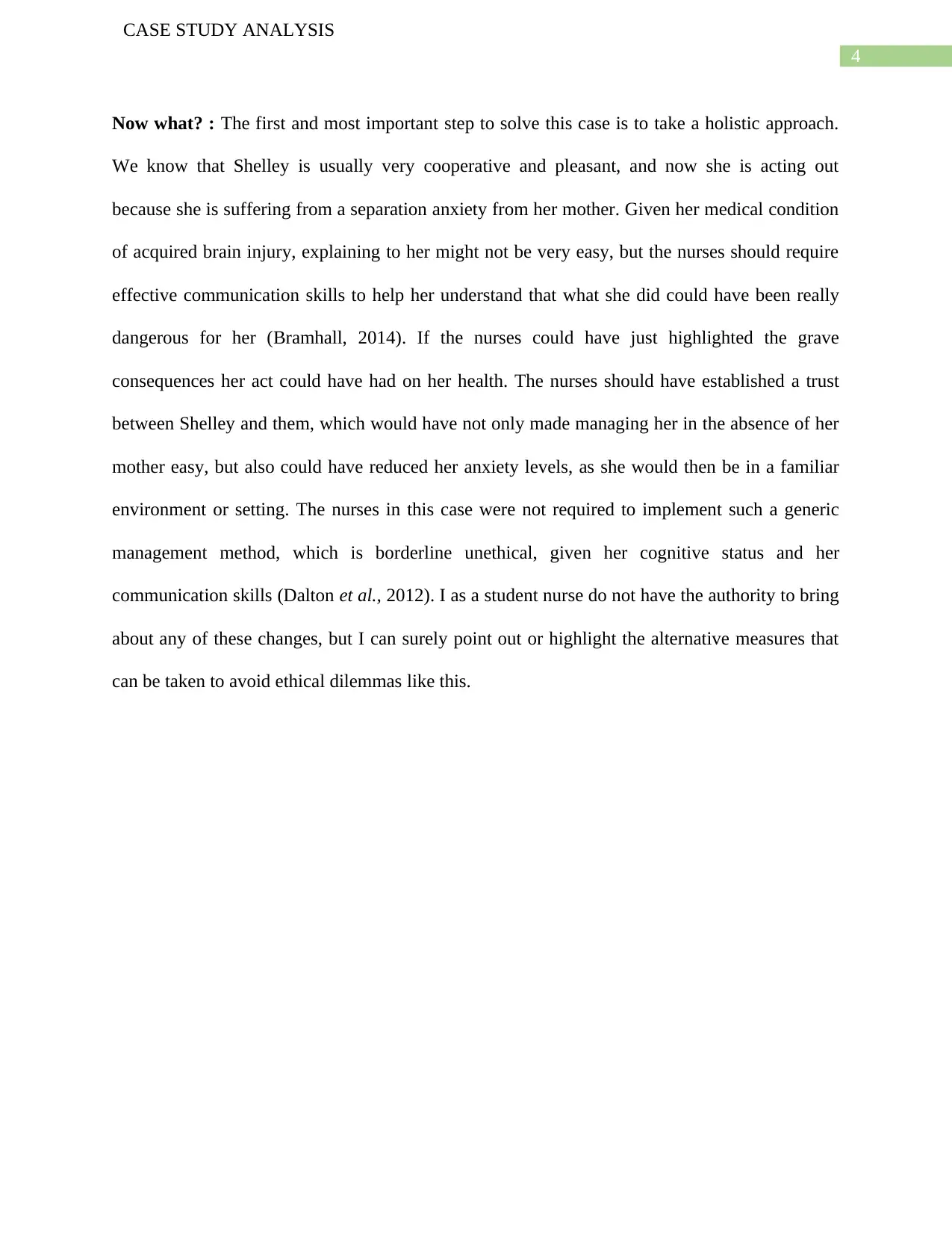
4
CASE STUDY ANALYSIS
Now what? : The first and most important step to solve this case is to take a holistic approach.
We know that Shelley is usually very cooperative and pleasant, and now she is acting out
because she is suffering from a separation anxiety from her mother. Given her medical condition
of acquired brain injury, explaining to her might not be very easy, but the nurses should require
effective communication skills to help her understand that what she did could have been really
dangerous for her (Bramhall, 2014). If the nurses could have just highlighted the grave
consequences her act could have had on her health. The nurses should have established a trust
between Shelley and them, which would have not only made managing her in the absence of her
mother easy, but also could have reduced her anxiety levels, as she would then be in a familiar
environment or setting. The nurses in this case were not required to implement such a generic
management method, which is borderline unethical, given her cognitive status and her
communication skills (Dalton et al., 2012). I as a student nurse do not have the authority to bring
about any of these changes, but I can surely point out or highlight the alternative measures that
can be taken to avoid ethical dilemmas like this.
CASE STUDY ANALYSIS
Now what? : The first and most important step to solve this case is to take a holistic approach.
We know that Shelley is usually very cooperative and pleasant, and now she is acting out
because she is suffering from a separation anxiety from her mother. Given her medical condition
of acquired brain injury, explaining to her might not be very easy, but the nurses should require
effective communication skills to help her understand that what she did could have been really
dangerous for her (Bramhall, 2014). If the nurses could have just highlighted the grave
consequences her act could have had on her health. The nurses should have established a trust
between Shelley and them, which would have not only made managing her in the absence of her
mother easy, but also could have reduced her anxiety levels, as she would then be in a familiar
environment or setting. The nurses in this case were not required to implement such a generic
management method, which is borderline unethical, given her cognitive status and her
communication skills (Dalton et al., 2012). I as a student nurse do not have the authority to bring
about any of these changes, but I can surely point out or highlight the alternative measures that
can be taken to avoid ethical dilemmas like this.
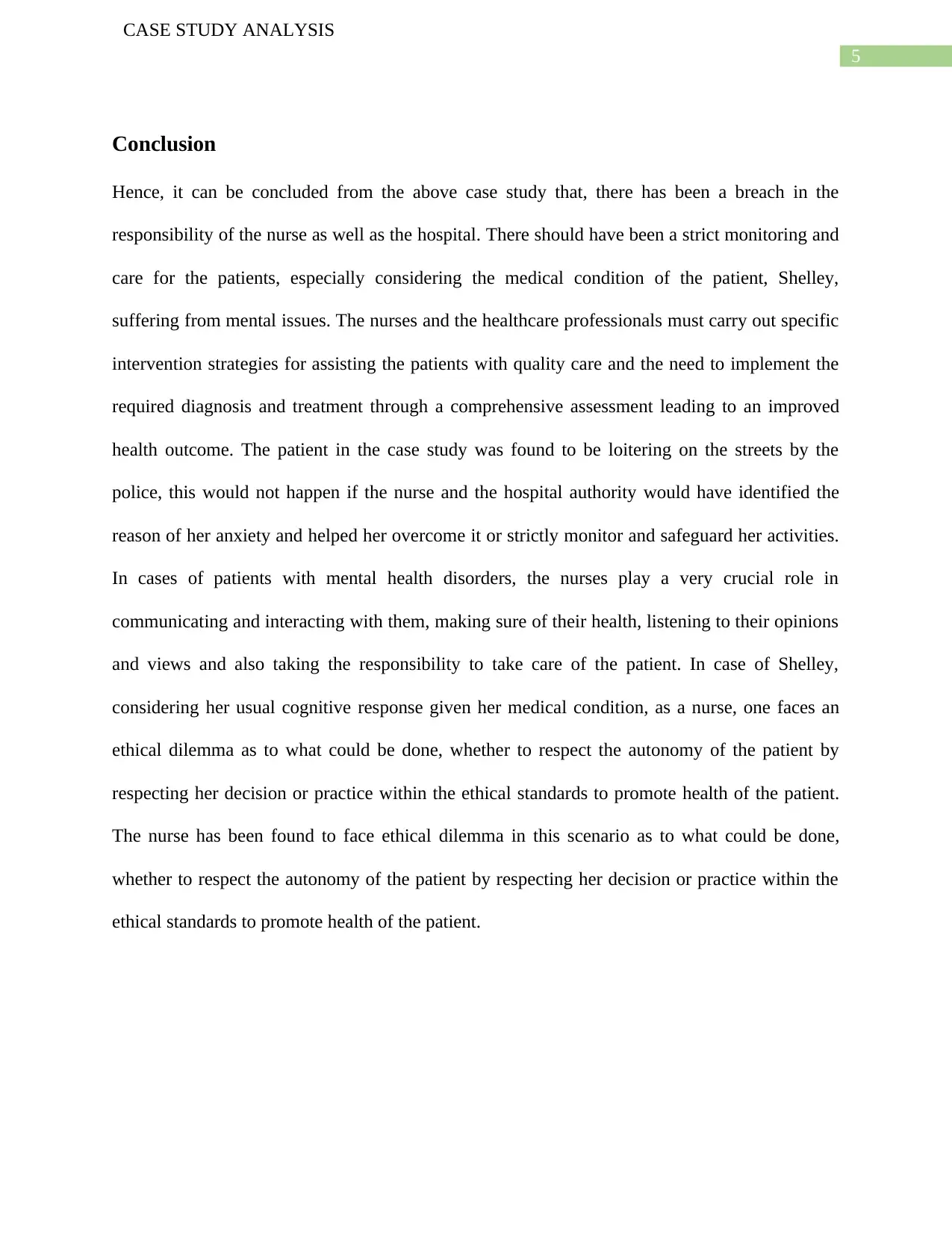
5
CASE STUDY ANALYSIS
Conclusion
Hence, it can be concluded from the above case study that, there has been a breach in the
responsibility of the nurse as well as the hospital. There should have been a strict monitoring and
care for the patients, especially considering the medical condition of the patient, Shelley,
suffering from mental issues. The nurses and the healthcare professionals must carry out specific
intervention strategies for assisting the patients with quality care and the need to implement the
required diagnosis and treatment through a comprehensive assessment leading to an improved
health outcome. The patient in the case study was found to be loitering on the streets by the
police, this would not happen if the nurse and the hospital authority would have identified the
reason of her anxiety and helped her overcome it or strictly monitor and safeguard her activities.
In cases of patients with mental health disorders, the nurses play a very crucial role in
communicating and interacting with them, making sure of their health, listening to their opinions
and views and also taking the responsibility to take care of the patient. In case of Shelley,
considering her usual cognitive response given her medical condition, as a nurse, one faces an
ethical dilemma as to what could be done, whether to respect the autonomy of the patient by
respecting her decision or practice within the ethical standards to promote health of the patient.
The nurse has been found to face ethical dilemma in this scenario as to what could be done,
whether to respect the autonomy of the patient by respecting her decision or practice within the
ethical standards to promote health of the patient.
CASE STUDY ANALYSIS
Conclusion
Hence, it can be concluded from the above case study that, there has been a breach in the
responsibility of the nurse as well as the hospital. There should have been a strict monitoring and
care for the patients, especially considering the medical condition of the patient, Shelley,
suffering from mental issues. The nurses and the healthcare professionals must carry out specific
intervention strategies for assisting the patients with quality care and the need to implement the
required diagnosis and treatment through a comprehensive assessment leading to an improved
health outcome. The patient in the case study was found to be loitering on the streets by the
police, this would not happen if the nurse and the hospital authority would have identified the
reason of her anxiety and helped her overcome it or strictly monitor and safeguard her activities.
In cases of patients with mental health disorders, the nurses play a very crucial role in
communicating and interacting with them, making sure of their health, listening to their opinions
and views and also taking the responsibility to take care of the patient. In case of Shelley,
considering her usual cognitive response given her medical condition, as a nurse, one faces an
ethical dilemma as to what could be done, whether to respect the autonomy of the patient by
respecting her decision or practice within the ethical standards to promote health of the patient.
The nurse has been found to face ethical dilemma in this scenario as to what could be done,
whether to respect the autonomy of the patient by respecting her decision or practice within the
ethical standards to promote health of the patient.
⊘ This is a preview!⊘
Do you want full access?
Subscribe today to unlock all pages.

Trusted by 1+ million students worldwide
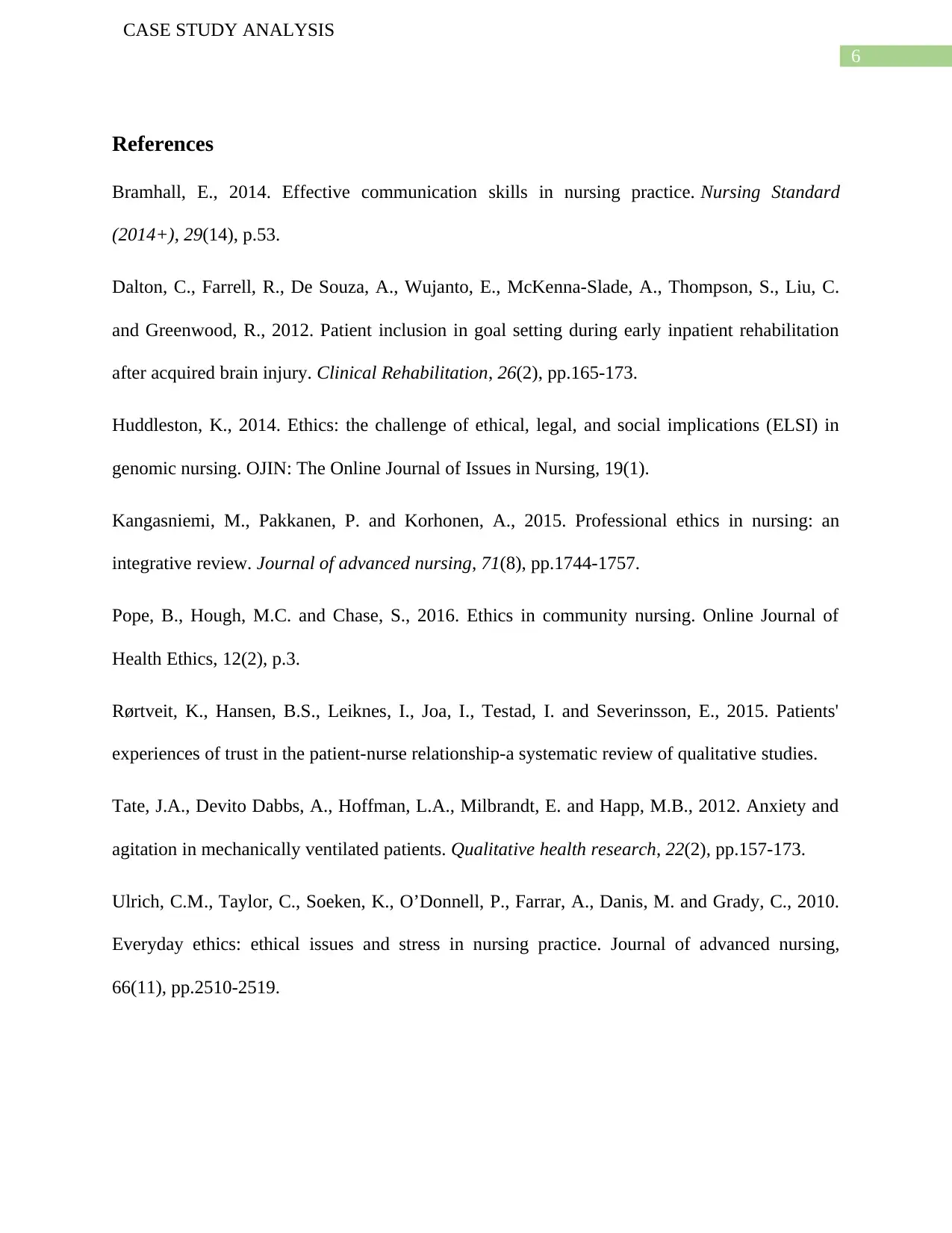
6
CASE STUDY ANALYSIS
References
Bramhall, E., 2014. Effective communication skills in nursing practice. Nursing Standard
(2014+), 29(14), p.53.
Dalton, C., Farrell, R., De Souza, A., Wujanto, E., McKenna-Slade, A., Thompson, S., Liu, C.
and Greenwood, R., 2012. Patient inclusion in goal setting during early inpatient rehabilitation
after acquired brain injury. Clinical Rehabilitation, 26(2), pp.165-173.
Huddleston, K., 2014. Ethics: the challenge of ethical, legal, and social implications (ELSI) in
genomic nursing. OJIN: The Online Journal of Issues in Nursing, 19(1).
Kangasniemi, M., Pakkanen, P. and Korhonen, A., 2015. Professional ethics in nursing: an
integrative review. Journal of advanced nursing, 71(8), pp.1744-1757.
Pope, B., Hough, M.C. and Chase, S., 2016. Ethics in community nursing. Online Journal of
Health Ethics, 12(2), p.3.
Rørtveit, K., Hansen, B.S., Leiknes, I., Joa, I., Testad, I. and Severinsson, E., 2015. Patients'
experiences of trust in the patient-nurse relationship-a systematic review of qualitative studies.
Tate, J.A., Devito Dabbs, A., Hoffman, L.A., Milbrandt, E. and Happ, M.B., 2012. Anxiety and
agitation in mechanically ventilated patients. Qualitative health research, 22(2), pp.157-173.
Ulrich, C.M., Taylor, C., Soeken, K., O’Donnell, P., Farrar, A., Danis, M. and Grady, C., 2010.
Everyday ethics: ethical issues and stress in nursing practice. Journal of advanced nursing,
66(11), pp.2510-2519.
CASE STUDY ANALYSIS
References
Bramhall, E., 2014. Effective communication skills in nursing practice. Nursing Standard
(2014+), 29(14), p.53.
Dalton, C., Farrell, R., De Souza, A., Wujanto, E., McKenna-Slade, A., Thompson, S., Liu, C.
and Greenwood, R., 2012. Patient inclusion in goal setting during early inpatient rehabilitation
after acquired brain injury. Clinical Rehabilitation, 26(2), pp.165-173.
Huddleston, K., 2014. Ethics: the challenge of ethical, legal, and social implications (ELSI) in
genomic nursing. OJIN: The Online Journal of Issues in Nursing, 19(1).
Kangasniemi, M., Pakkanen, P. and Korhonen, A., 2015. Professional ethics in nursing: an
integrative review. Journal of advanced nursing, 71(8), pp.1744-1757.
Pope, B., Hough, M.C. and Chase, S., 2016. Ethics in community nursing. Online Journal of
Health Ethics, 12(2), p.3.
Rørtveit, K., Hansen, B.S., Leiknes, I., Joa, I., Testad, I. and Severinsson, E., 2015. Patients'
experiences of trust in the patient-nurse relationship-a systematic review of qualitative studies.
Tate, J.A., Devito Dabbs, A., Hoffman, L.A., Milbrandt, E. and Happ, M.B., 2012. Anxiety and
agitation in mechanically ventilated patients. Qualitative health research, 22(2), pp.157-173.
Ulrich, C.M., Taylor, C., Soeken, K., O’Donnell, P., Farrar, A., Danis, M. and Grady, C., 2010.
Everyday ethics: ethical issues and stress in nursing practice. Journal of advanced nursing,
66(11), pp.2510-2519.
1 out of 7
Related Documents
Your All-in-One AI-Powered Toolkit for Academic Success.
+13062052269
info@desklib.com
Available 24*7 on WhatsApp / Email
![[object Object]](/_next/static/media/star-bottom.7253800d.svg)
Unlock your academic potential
Copyright © 2020–2026 A2Z Services. All Rights Reserved. Developed and managed by ZUCOL.





